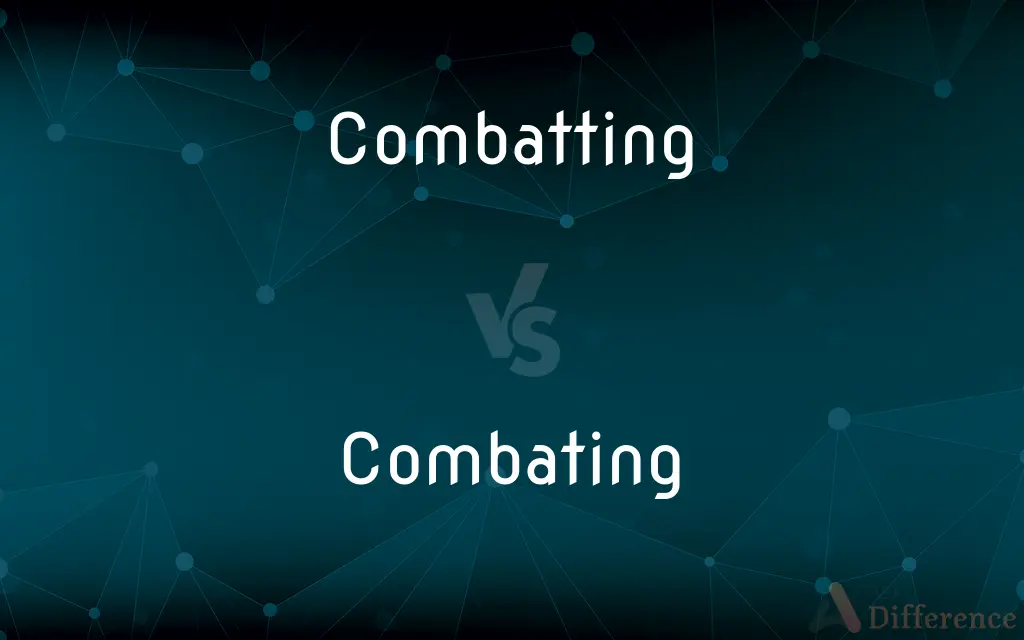Combatting vs. Combating — What's the Difference?
By Tayyaba Rehman & Fiza Rafique — Updated on March 17, 2024
Both terms mean fighting against but "combating" is the more commonly accepted spelling.

Difference Between Combatting and Combating
Table of Contents
ADVERTISEMENT
Key Differences
"Combatting" and "combating" are two variations of the verb that means to fight or contend against something, often used in the context of addressing issues, challenges, or adversaries. The primary difference between them lies in spelling preferences, with "combating" being the more traditionally accepted form in both American and British English. However, "combatting," with a double "t," is also considered correct and is used by some to reflect a preference for a spelling that more closely matches the pronunciation and the rule of doubling the final consonant when adding an -ing ending to a verb that ends with a vowel followed by a consonant.
In terms of usage, both forms are understood in the same way and can be used interchangeably without changing the meaning of a sentence. The choice between "combatting" and "combating" often comes down to personal or editorial preference, with "combating" being favored in more formal writing and publications.
The context in which these terms are used can range from literal, physical combat or warfare to metaphorical battles against abstract concepts, such as combating poverty, disease, or climate change. Regardless of the spelling, the action implies a proactive and aggressive approach to confronting and overcoming the issue at hand.
While the spelling variations might imply regional preferences, modern usage tends to favor "combating" across both American and British English, reflecting a trend towards standardized spelling in global communication. However, it is not uncommon to see "combatting" used in various texts, underscoring the flexibility and evolving nature of English spelling conventions.
Comparison Chart
Spelling
Double "t" variation.
Single "t" variation, more commonly accepted.
ADVERTISEMENT
Usage
Considered correct, less common.
Preferred in formal writing and publications.
Context
Used to describe fighting against challenges or adversaries.
Same as combatting, with no difference in meaning.
Regional Preference
No strong regional preference; personal or editorial choice.
Favored across both American and British English.
Formality
Used interchangeably with combating.
Seen as more formal due to widespread acceptance.
Compare with Definitions
Combatting
Acting to stop or fight against something.
They are combatting climate change through innovative technologies.
Combating
The act of fighting or opposing.
Combating illegal logging is crucial for conservation.
Combatting
Accepted in English but less common than combating.
Combatting disease is a global priority.
Combating
Conveys a proactive stance.
Combating hunger is a key goal of the charity.
Combatting
Used in various contexts from warfare to social issues.
Combatting misinformation online requires constant vigilance.
Combating
Applies to both literal and metaphorical battles.
Policies aimed at combating inflation were introduced.
Combatting
Can reflect a more phonetic spelling choice.
Her organization focuses on combatting poverty in urban areas.
Combating
Preferred spelling in formal texts.
International agencies are combating the spread of the virus.
Combatting
Shows action and opposition.
Combatting discrimination requires education and awareness.
Combating
Reflects a standard approach to spelling.
Combating corruption requires transparency and accountability.
Combatting
To oppose in battle; fight against.
Combating
To oppose in battle; fight against.
Combatting
To act or work in order to eliminate, curtail, or stop
Efforts to combat crime.
Drugs that combat infection.
Combating
To act or work in order to eliminate, curtail, or stop
Efforts to combat crime.
Drugs that combat infection.
Combatting
To engage in fighting; contend or struggle.
Combating
To engage in fighting; contend or struggle.
Combatting
Fighting, especially with weapons
Naval combat.
Combating
Fighting, especially with weapons
Naval combat.
Combatting
Contention or strife
Rhetorical combat.
Combating
Contention or strife
Rhetorical combat.
Combatting
Of or relating to combat
Flew 50 combat missions.
Combating
Of or relating to combat
Flew 50 combat missions.
Combatting
Intended for use or deployment in combat
Combat boots.
Combat troops.
Combating
Intended for use or deployment in combat
Combat boots.
Combat troops.
Combatting
Present participle of combat
Combating
Alternative spelling of combatting: combat
Common Curiosities
Can both spellings be used interchangeably?
Yes, both spellings can be used interchangeably without affecting the meaning of a sentence.
Is one form more common in British or American English?
"Combating" is favored in both American and British English, while "combatting" is less commonly used but still acceptable.
Can the use of combatting vs. combating indicate a writer's regional background?
Not reliably, as preferences can vary widely even within regions.
Which is correct: combatting or combating?
Both spellings are correct, but "combating" is more commonly accepted and used.
Why are there two spellings for combating?
The two spellings reflect different preferences for handling the doubling of the final consonant in verbs when adding an -ing ending.
Does the choice of spelling reflect on the writer's proficiency?
Not necessarily, as both forms are considered correct. It may, however, reflect personal or editorial preference.
How can I decide which spelling to use?
Consider your audience and the context of your writing; you may also follow the style guide if one is applicable.
Is there a difference in meaning between combatting and combating?
No, there is no difference in meaning. The variation lies only in the spelling.
Which spelling should I use in formal writing?
"Combating" is preferred in formal writing and publications due to its more widespread acceptance.
Are there any rules for when to use combatting versus combating?
There are no strict rules, but "combating" is generally preferred for its simplicity and widespread acceptance.
Has the preference between these spellings changed over time?
Yes, language evolves, and spelling preferences can shift. Currently, "combating" is more widely accepted.
Do dictionaries list both spellings?
Yes, many dictionaries list both spellings as acceptable variations of the verb.
Is there any scenario where one spelling is preferred over the other?
In formal writing and publications, "combating" is often preferred for its standardization and wider acceptance.
Will the spelling choice affect the reader's understanding?
No, the choice between "combatting" and "combating" does not affect the reader’s understanding due to their identical meanings.
Is combatting considered informal?
Not inherently, but "combating" is more commonly seen in formal contexts.
Share Your Discovery

Previous Comparison
Bimonthly vs. Biweekly
Next Comparison
Grande vs. GrandAuthor Spotlight
Written by
Tayyaba RehmanTayyaba Rehman is a distinguished writer, currently serving as a primary contributor to askdifference.com. As a researcher in semantics and etymology, Tayyaba's passion for the complexity of languages and their distinctions has found a perfect home on the platform. Tayyaba delves into the intricacies of language, distinguishing between commonly confused words and phrases, thereby providing clarity for readers worldwide.
Co-written by
Fiza RafiqueFiza Rafique is a skilled content writer at AskDifference.com, where she meticulously refines and enhances written pieces. Drawing from her vast editorial expertise, Fiza ensures clarity, accuracy, and precision in every article. Passionate about language, she continually seeks to elevate the quality of content for readers worldwide.















































